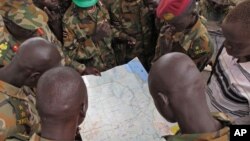Darfur is began voting on Monday in a referendum on whether to reunite the states of their arid western region into one entity, a poll that Sudan says will settle a contentious issue at the heart of the long-running conflict.
The Sudanese government's decision to split Darfur into three states in 1994 helped fuel discontent that erupted into fighting in 2003 — rebels and many from the large Fur tribe said the break-up allowed Khartoum to divide and rule them.
Sudan, which later split Darfur further into five states, has presented this week's vote as a major concession. But rebel and opposition groups have again cried foul, saying the vote will be rigged and calling on their supporters to boycott it.
Students inside El Fasher University, in the government-controlled capital of North Darfur state, protested against the vote and witnesses said similar rallies took place in at least three refugee camps in Central Darfur state.
"I will not take part in the referendum as the results are already known. The option of states will win as this is what the government wants. This referendum is meaningless," said one man at Abu Shouk refugee camp outside El Fasher, where the turnout was weak.
Analysts and diplomats say the government opposes a unified Darfur, concerned that this would give the rebels a platform to push for independence— just as the south successfully did in 2011, taking with it most of the country's oil reserves.
Turnout was strong in the center of El Fasher, where security forces were out in force.
Rebel boycott
"We came out since morning to give our opinion... I want the states system, it's best for us," Samia Abkar, a 24-year-old woman in tattered clothing, told Reuters at a polling center.
The Darfur conflict began in 2003 when mainly non-Arab tribes took up arms against the Arab-led government based in the capital Khartoum, accusing it of discrimination and of marginalizing the area.
According to the United Nations, as many as 300,000 people have been killed in Darfur, some 4.4 million people need aid and more than 2.5 million have been displaced.
Although the killings have eased in recent years, the insurgency continues and Khartoum has sharply escalated attacks on rebel groups over the past year.
The two main rebel groups fighting in Darfur, the Justice and Equality Movement and the Sudan Liberation Army, have called on their followers not to take part in the three-day referendum.
They had called for a political settlement to come first and have warned that the referendum will only lead to more violence.
South Sudan, roughly the same size as a unified Darfur, fought the north through decades of civil war until a 2005 peace deal gave it the right to a referendum on whether to secede.
In 2011, southerners overwhelmingly voted to declare independence and South Sudan became independent that year though both countries remain at loggerheads over disputed territories and other issues while the south has slipped into civil war.





